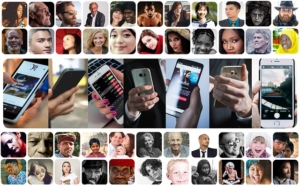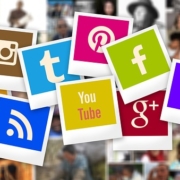Virtual sociality
From Facebook stalking to Twitter following, we’re virtually obsessed with each other (ambiguity intended). So what’s the deal? How does social media satisfy our real needs?
Digging deep into history
That Abraham Maslow was a clever chap. He recognised our hierarchy of needs. What he didn’t know is, pushing 70 years later, we’d become so busy and digitally savvy that online socialising would play an important role in fulfilling these needs.
How can social media meet our core needs?
While technology has evolved massively since Maslow proposed his theory in 1943, fundamental human needs haven’t. And that’s worth remembering as social media continues to flood the scene. The knowledge that however technology develops, human nature remains. That’s not to say our behaviour won’t be shaped by nurture, but our natural instincts stay constant (hello, classic nature Vs nurture debate). Some very important lessons can be learned from understanding our primal needs. Thinking along these lines will help you to plan and implement a social media strategy that’s onside with your following.
In a very particular pyramid (it’s what Maslow intended), here’s how social media satisfies our needs. Look out for the sharp sword undercurrent. True to life, it ain’t sunny every day and social media is no exception.
From the top (most complex needs):
1. Self-actualisation bliss
Morality | Creativity | Spontaneity | Problem solving | Lack of prejudice | Acceptance
How social media answers these needs
Sunny day (yay): You can promote your sparkling creation, air your moralistic rants, broadcast a charitable event, share your ideas and engage in random conversations with all sorts of people, brands and organisations at the drop of a hat. You can even ask your audience a question and they’ll most likely help you solve it (if you can grin and bear the odd joker taking an opportune moment to steal the show and remind you why you haven’t seen them for years and don’t intend to, EVER again). The fact that you’re socialising with people who you may not necessarily see (or even know) creates an illusion of instant acceptance. Forget prejudice. It doesn’t matter who you are, it’s what you’re saying that counts… or is it?
 Sharp sword (ouch): Social interactions online aren’t the full story. Who says some people aren’t judging you on what you say? Or more to the point, people aren’t prejudice towards who you are? Especially if you’re a brand. You can’t presume your following are onside. It takes a carefully planned and consistently relevant strategy to probe followers to react favourably.
Sharp sword (ouch): Social interactions online aren’t the full story. Who says some people aren’t judging you on what you say? Or more to the point, people aren’t prejudice towards who you are? Especially if you’re a brand. You can’t presume your following are onside. It takes a carefully planned and consistently relevant strategy to probe followers to react favourably.
Real-life horror story (eek): I was burnt myself recently, after it transpired a mutual family friend had found a new hobby. It was called “Updating Sally’s family members with her daily activities” (courtesy of Facebook). While I’m flattered that events in my dazzling world (what can I say) struck such a chord that one felt the need to continually update non-Facebooking family members, the principle of spy-gate left a rather unsavoury odour in the air, which could only be evaporated by a full privacy lockdown.
As Mum says, “It’s all a bit Daily Fail.” No-one wants to feel like a grease-stained red top that’s been so well-thumbed the smudged words have lost their meaning.
2. Ego boost central
Self-esteem | Confidence | Achievement | Respect of others | Respect by others
How social media answers these needs
Sunny day (yay): You can buy virtually everything online now, so why not social acceptance? Social media is a great way to gain instant, widespread public affirmation when your following react (hopefully positively) to your news, or you engage and contribute some tasty fodder to their feed. That’s one gigantic tick for social acceptance. Hello high self-esteem, confidence, achievement, mutual respect and all those other fuzzy feelings of fulfilment, which typically offer temporary consolation for passing away the day (before rotten guilt reminds you of your shameful procrastination).
Sharp sword (ouch): On the flip side, if you’re so busy (and naive) that you need to do your full weekly (or monthly – you may be less high-maintenance) esteem shop online, prepare for the harsh reality that you won’t always gain that gigantic social acceptance tick quite so readily. Not everyone might agree with what you have to say. Need I mention that agency viral video which caused the brand in question to catch a virus? Frantically trying to hide the instigator only added mucus to an already sticky situation.
As soon as you saw ‘respect’ in the line-up, you knew it was in for a fall. Apparently, some folk have no respect for themselves or others when it comes to spouting obscenities on social feeds. Regardless of whether such delightful sentiments are borne out of jubilant or disgruntled feelings, it’s dangerous to give it all away and muddy your reputation (you never know who’s reading). Family friends (been there, retorted that), your current or even prospective employer, hint hint. So before you fancy pumping up your ego with a little self-promotion and the like, think carefully about how this’ll fare with your following.
Real-life horror story (eek): McDonald’s recent Twitter campaign showed how social media can backfire. Add a proportion of people who don’t respect the brand in the first place to a very vague hashtag, and there you have the recipe for a social storm.
You know what they say – give them an inch.
3. Adoration (once again)
Friendship | Family | Love | Sexual intimacy
How social media answers these needs
Sunny day (yay): Being part of a social media community can evoke a real sense of belonging… Actually, squish all of the above (you know, the social acceptance malarkey) into this. It’s equally relevant.
Sharp sword (ouch): Thankfully, sexual intimacy can be left out of the social media equation (unless that’s how you roll, but we’ll leave you and your, erm, Nik-Nak stained fingers to it).
4. Safety and security
Body | Employment | Resources | Morality | Family | Health | Property
How social media answers these needs
Sunny day (yay): Everyone loves to feel safe and secure, so when you can instantly lean on so many of your favourite people all at once, it’s reassuring to have so many resources at your instant disposal.
Sharp sword (ouch): Our perception of ‘safety’ in online communities is an interesting juxtaposition. On the one hand, because we’re slouched in a hoodie scoffing cornflakes or donning a dickie bow supping champagne (either/or), we’re in our comfortable cocoon. None of the awkward clamminess you experience in a roomful of strangers exists. And it’s little wonder – because, more often than not, you don’t have to face these people in the cold light of day, so you feel liberated to be less conserved and more relaxed while chatting in Calibri. In the same breath, what you say online could prove to be far more dangerous, as my real-life horror stories show.
So there you have an unguarded personal mindset that plays straight into the hands of social media – public property. People open up more in social feeds. Suddenly you don’t feel shy talking to Mary from high-school (who you were secretly scared of) and you’re prepared to engage in a full-on conversation and fill them in on the past 15 years – something less likely to happen offline.
On the flip side, I was having lunch with someone the other day and they were so preoccupied checking their social media feed it was impossible to engage in a proper conversation. At what point do we let social media become an offline barrier? It’s like recording stunning New Year fireworks from Sydney’s harbourside. You’re so intent recording the spectacle, you forget to saviour the moment with your naked eye. But that’s okay – you freeze-framed it forever on your phone. Life through a lens eh.

5. Survival
Breathing | Food | Water | Sex | Sleep | Homeostasis | Excretion
How social media answers these needs
Sunny day (yay): Social media has become engrained into our fundamental daily routines.
Obviously, we can’t gain intrinsic necessities online (although there’s probably an app being devised to download a pop-up pizza, which your hard drive heats before your DVD drive spits it out), we can certainly talk about it. From posting a picture of your scrumptious lunch (because it’s too beautiful not to share), to raving about your crazed sleep deprivation or bragging about your Monday morning lie-in, social media is a habitual way of life. It’s with us everywhere we go. It doesn’t stop rolling until we stop feeding. But something in you has to want to, so what’s your motivator and what triggers you?
Sharp sword (ouch): As for excretion, one doesn’t care to know if you’ve just miscarried last night’s curry, or that you can’t sleep because the flat upstairs has a leaking pipe (or worse still, incontinence – something Yorkshire Water can’t fix).
The moral of the social story
Just because you’re cocooned in comfort when you engage in online social circles, doesn’t mean it’s any safer to let it all hang out. It’s a bit like being naked in a room full of strangers. You just wouldn’t or… (again, unless that’s your thing).
Awareness of the double-edged sword of social media is crucial. You’re in control of what you say, but you can’t control what others say. So if you want to avoid a storm, it’s wise to fully understand your audience and not underestimate any opportunity you may provide for them to contribute to your public demise.
We’re all just human, after all.
About the Author: Sally Symondson

Running Salsify Creative, Sally grows local and global brands with meaningful words that relate. Customer or business – the roots are human, which is why Sally likes to keep it natural. You’ll find her muddy soled at the copywriting “allotment” with a cat in tow.
Join me on www.salsifycreative.com/blog/



 slogan-copywriter-collective
slogan-copywriter-collective
Trackbacks & Pingbacks
[…] was a sensation in 2004. That technology allowed us to record, upload and view but 12 years later the mobile phone has become a broadcasting device that allows […]
Comments are closed.